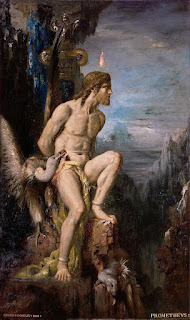Week 10: Story Lab, Mythology Crash Course
What is a Myth? Crash Course Mythology #1
- One of the most interesting notions that I've got from this video is how that myths have no definite and clear message intended by the author themselves. Instead, all the myths are up to interpretation.
- What is it about myths that make them worth telling again?
- I find it interesting where the one of the general concepts of myths were to explain the questions of the universe and generally how things work. In these day and age, of course, science can take place of myths in explaining the reasons. However, back then, there were no science to back up the reasons for these existential questions, so they propose an explanation for it by the powers of their "gods."
- For instance, in the video, the interactions between the Greek gods, Persephone and Hades, were the reasons for the coming and go of seasons like winter and spring.
- It does make me wonder, how did the first person come up with these gods and how did a single story of their origin came to fame and popularity that it lasted centuries upon centuries?
- Critical analysis of myths have been around for a long time, which showed that not only did people not accept the concept of these myths but these analysts aim at the reasons for the creation of myths that can span from religion to psychoanalysis.
- One of the reasons described in the video was the fact that these myths were created for the purpose of rational functional within societies, such as the purpose to "safeguard and enforces morality"
- What would happen to societies if there were no myths?
- Ancients gods of some of the first civilizations of hunter-gatherers were often female, which can be explained in the matter that the Earth is giving and nurturing as it gives the sense of life to those people. This can be argued with the gods of more developed industrialists, which grew their own food and lifestyle being more rugged and cruel as compared to their hunter-gatherer counterparts.
- I think that I can agree with the notion that the creation of myths were to give the people something to believe and keep peace for things that they can't control nor explain.
- As such, in the the psychoanalytic era of Freud and Jung, I find it fascinating that they accounted myths as extensions of the human unconscious mind, which does not confer individualism but is universal in ALL people
- This can explain why in many societies, the gods represent similar archetypes as those around the world.
- One of the most investing things that I took from this video was the concept of mono-myth, where the general stages of the "Hero's Journey" or stories of heroes worldwide tend to follow similar archetypes.
- This can be accounted to the universalism of ideal self and how the creation of these stories reveal the necessities of life that we as humans consider worthy and must go through in order to gain our best selves.
- What does this say about the mind of humans universally? Does this mean that upbringing and environment doesn't contribute?
(Prometheus. Source: Wikimedia)




Comments
Post a Comment